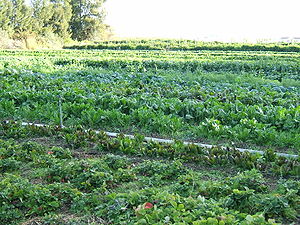 Image via Wikipedia
Image via Wikipedia
Hey folks, if you've been checking things out on my blog I'm sure you've noticed that most of the ingredients in my recipes are organic. If you have been interested in switching to a more organic diet you may want some more information on the benefits of eating organically. And while the health benefits are numerous did you know that organic foods can also help to improve the environment as well as the economy? Well it's true!
It's commonly known these days but often overlooked that many farmers use pesticides and other chemicals when growing many of the fruits and veggies we eat on a daily basis. Now even though many of these pesticides and chemicals have said to be safe, many still have concerns. Conventionally grown crops are sprayed with significant amounts of pesticides, herbicides, fungicides, rodenticides, and chemical fertilizers. These chemicals are designed to kill other forms of life and you may very well be eating them. Don’t think you’re safe just because you rinse your food. While it does help, many of the chemicals are deeply absorbed and just the act of rinsing off your produce is not a sufficient method of removing these toxins.
Were you aware that many soils become contaminated when the use of pesticides, fertilizers and other similar chemicals are present? And due to soil contamination many farmers who wish to switch from conventional methods of farming to organic methods must overhaul their fields or wait a specific period of time until their soils can be considered clean again.
In this economy many farmers are getting a second chance with organic foods. It can be a very expensive venture running a farm and getting certified as an organic grower can be a difficult task. QAI (Quality Assurance International) is an organization that issues certification but the process is not easy to pass and a number of strict rules must be followed and certain qualifications must be met. Although it takes a lot of hard work and determination many farmers are finding big payoffs to making the switch.
One way I support organic farmers is by going to local farmers markets and buying as much locally grown organic produce directly from the growers as I can. It's a great way to help build economic strength in your community and gives me a sense of connection to the land and to the people involved in growing the food I consume. Plus in my opinion the items I get at the farmers markets always seem to taste so much better than that in the major grocery stores.
Thanks for reading, more info is on the way. Remember, eat organically!
It's commonly known these days but often overlooked that many farmers use pesticides and other chemicals when growing many of the fruits and veggies we eat on a daily basis. Now even though many of these pesticides and chemicals have said to be safe, many still have concerns. Conventionally grown crops are sprayed with significant amounts of pesticides, herbicides, fungicides, rodenticides, and chemical fertilizers. These chemicals are designed to kill other forms of life and you may very well be eating them. Don’t think you’re safe just because you rinse your food. While it does help, many of the chemicals are deeply absorbed and just the act of rinsing off your produce is not a sufficient method of removing these toxins.
Were you aware that many soils become contaminated when the use of pesticides, fertilizers and other similar chemicals are present? And due to soil contamination many farmers who wish to switch from conventional methods of farming to organic methods must overhaul their fields or wait a specific period of time until their soils can be considered clean again.
In this economy many farmers are getting a second chance with organic foods. It can be a very expensive venture running a farm and getting certified as an organic grower can be a difficult task. QAI (Quality Assurance International) is an organization that issues certification but the process is not easy to pass and a number of strict rules must be followed and certain qualifications must be met. Although it takes a lot of hard work and determination many farmers are finding big payoffs to making the switch.
One way I support organic farmers is by going to local farmers markets and buying as much locally grown organic produce directly from the growers as I can. It's a great way to help build economic strength in your community and gives me a sense of connection to the land and to the people involved in growing the food I consume. Plus in my opinion the items I get at the farmers markets always seem to taste so much better than that in the major grocery stores.
Thanks for reading, more info is on the way. Remember, eat organically!
![Reblog this post [with Zemanta]](http://img.zemanta.com/reblog_e.png?x-id=4e87cabd-f2f0-489e-93c9-51f85433c3eb)




The next step is to go Vegetarian... eating meat does not stretch our resources out as sustainably and efficiently as a meat free diet. Say no to meat... raising livestock is not healthy for the planet... produces tremendous amounts of methane (greenhouse gas), and requires us to utilize grains to feed the animals rather than sending those grains straight to humans.
ReplyDelete